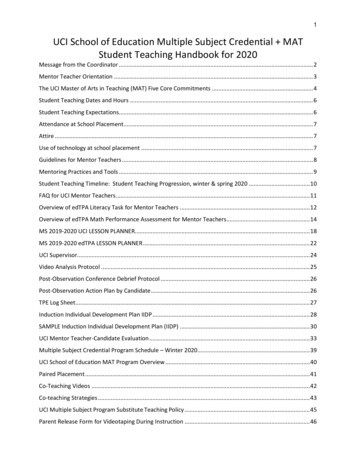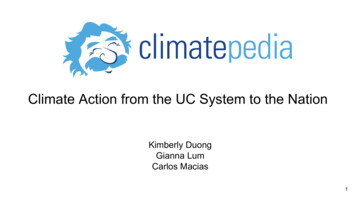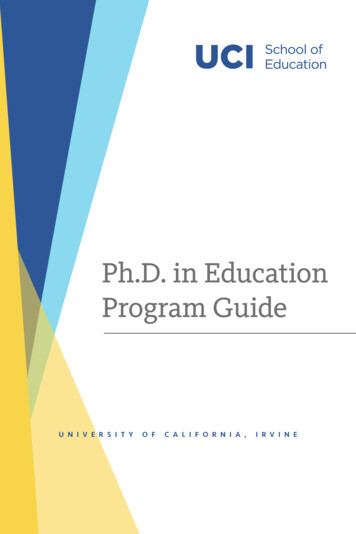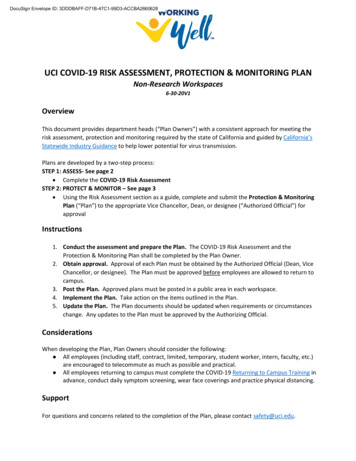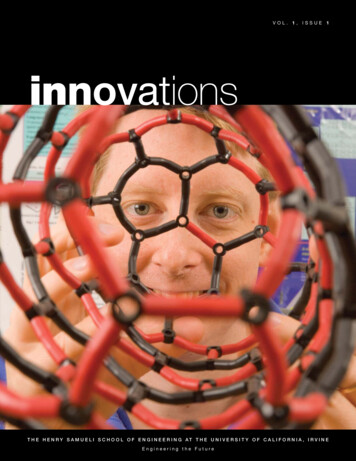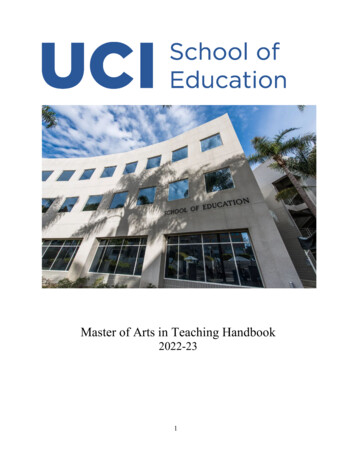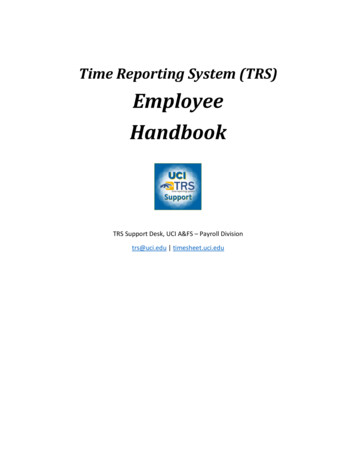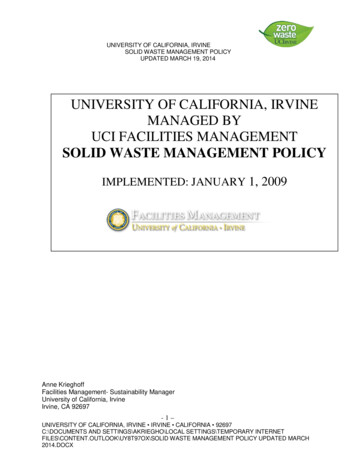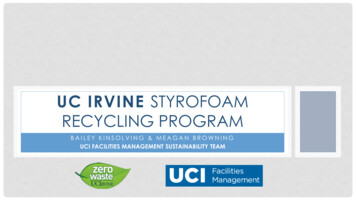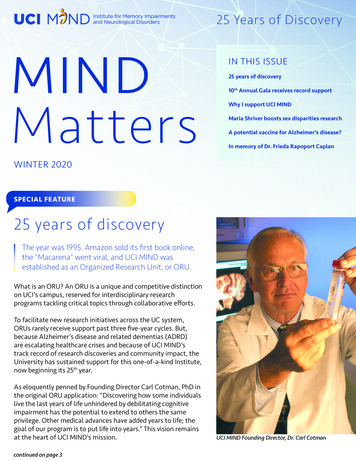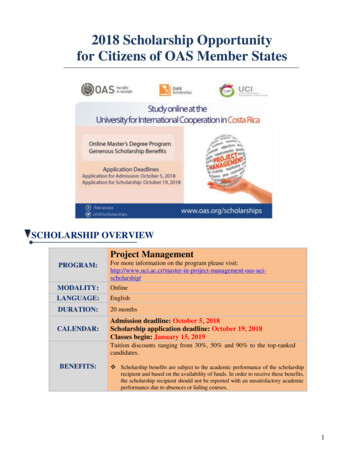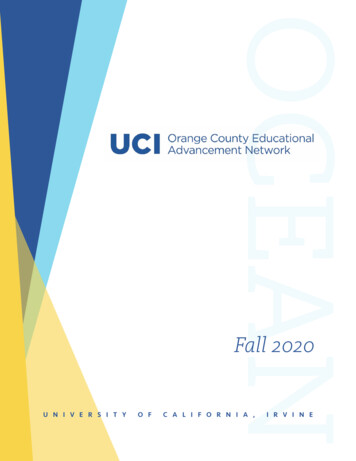
Transcription
Fall 2020U N I V E R S I T YO FC A L I F O R N I A ,I R V I N E
Table of ContentsWelcome from OCEAN Leadership2About OCEAN4Partnership Highlights5Student Profiles7Community Response to COVID-199Why Support OCEAN?10Foundation Support11Faculty Profiles12Summary of Projects141
W EL COME FROM DEA N RIC HA RD A RUMIn 2018, the UCI School of Education, in partnership with K-12 schools and with the support of privatedonors, established the Orange County Educational Advancement Network (OCEAN). This boldinitiative places School of Education faculty and graduate students at K-12 schools and allowsresearch topics to originate from, and reflect the needs of, the school sites. OCEAN also facilitatesconnections and catalyzes partnerships among K-12 schools, so that the School of Education canhelp address and improve common needs across the region.The initiative is creating a national model for how a school of education can partner with localschools to support and improve education.This year, schools across the nation underwent a seismic shift to remote instruction, and the futureof K-12 education remains unclear. OCEAN has enabled the School of Education - the No. 10 publicschool of education in the nation - to work closely with K-12 schools to support teachers, staff,students and their families during the pandemic. Our findings, along with the measures taken toassist the community, are detailed throughout this booklet.The School of Education’s mission is to advance educational sciences and improve educationalopportunities and outcomes for all individuals across the entire lifespan. Our research, communitypartnerships and programming are dedicated to producing innovative scholarship, addressingthe needs of local schools, and inspiring future generations of educators. Through OCEAN, we arereimagining how a school of education can, and should, serve its community of K-12 schools,students, and families.In 2019, the University of California, Irvine launched its 2 billion “Brilliant Future” campaign - thelargest philanthropic and alumni engagement endeavor in the history of Orange County. Recently,the New York Times recognized UCI as the nation’s No. 1 university doing the most to advanceupward mobility. The School of Education and its innovative programs play an essential role inearning that distinction.This booklet highlights the many ways in which OCEAN impacts the Orange County community.We invite you to support our bold vision – together we can ensure that students from all backgroundsachieve the American dream.Sincerely,Richard ArumDean and ProfessorUCI School of Education2
W EL COME FROM JUNE A HN, O C E A N DI RE C T OROCEAN represents a different way of doing research and making a direct impact oncommunities. In our partnerships, the needs of the community inform the scholarship weundertake. As a result, the research is directly relevant to the issues our partners aretrying to solve, and the link between research and practice becomes tighter.In our partnerships, we prioritize developing long-term relationships between communitypartners and researchers at the UCI School of Education. These relationships allow usto be nimble and shift research to fit the needs of partners as they arise, as well asbroker resources to our community partners when they need them most.I am so proud of what OCEAN has accomplished in two short years. Through thesupport of our private donors, we are currently funding 12 graduate student fellowships, whocombined are working with 10 local schools and nonprofit organizations. Numerousresearch projects have emerged from these partnerships: exploring restorative justicepractices, supporting young people’s personal passions and civic engagement, studyingthe impact of strong alumni and support programs for foster youth, examining how toimprove mentorship and internship programs to guide youth to career opportunities,working with local teachers to improve pedagogy, understanding the needs of bilingualstudents and families, supporting social-emotional learning, and developing new insightsto help learners with special needs. You can learn more about the various projects we’veundertaken, starting on page 14.Our work is also beginning to gain national attention. In 2020 we will receive externalfunding to expand our partnership research from sources such as the SpencerFoundation, National Science Foundation, and New Schools Venture Fund. The initialinvestment in community-focused research is paying dividends, and I’m excited forthe future of OCEAN.We thank you for your continued support to sustain and accelerate what is a unique modelof conducting partnership-based research to positively impact Orange County and beyond.June AhnFaculty Director of OCEAN and Associate ProfessorUCI School of Education3
ABOU T OCEA NWhat is OCEAN?Why OCEAN?OCEAN catalyzes research-practice partnerships (RPPs) byconnecting School of Education doctoral students and facultywith K-12 public schools and community nonprofits throughoutOrange County and the surrounding Southern California region.The partnerships study and co-design solutions to pressingregional challenges.At each site, a School of Education faculty member anddoctoral student work with partners to identify their greatestneeds and goals, and in turn conduct research that willpositively impact the local community.OCEAN is unique in a few ways. Targeted partnership researchallows community partners to inform UCI faculty and doctoralstudents about what they want to focus on, making sure thatresearch directly arises from community needs. Collaborationacross the network of OCEAN partners also has potential toproduce change at a systemic level. Our aspirations are tocreate the conditions for using research to guide improvementat both a micro and macro level.RESEARCH PHASEA UCI School of Education faculty member anddoctoral student are assigned to each school inthe OCEAN network. Working together, thepartnership team identifies goals and challenges,and produces research that addresses the specificneeds of the school.EXPLORATORY PHASEThe School of Education then brings togetherthe schools to identify common challenges, bestpractices and shared goals.Each partnership between the UCI School ofEducation and a school site produces uniqueresearch. The research is data-driven andspecific to the school, and its results can beacted upon immediately.NETWORKED IMPROVEMENT COMMUNITIESLocal schools, alongside the School of Education, can then implement a measured, trackable improvement plan. This groupis known as a Networked Improvement Community, or NIC. Not every school needs to participate in a given NIC project,so from a network of 12 schools, there exists thousands of possible combinations of participants and areas to focusimprovement efforts.4
PARTNE RSH IP H IGH LIG HT SMarco Forster Middle School & Breakthrough San Juan CapistranoSince 2018, doctoral student Jennifer Renick andProfessor Stephanie Reich have worked in a three-waypartnership between Marco Forster, Breakthrough SJCand the UCI School of Education. Breakthrough SJCsupports local, motivated students whose backgroundsare underrepresented in higher education by providingtuition-free academic programming and guidance frommiddle school through college graduation. The schoolrecruits its students from nearby Marco Forster MiddleSchool. More than 90 percent of Breakthrough SJCstudents will be the first in their families to graduatefrom college; 94 percent are students of color; 89percent qualify for free/reduced lunch, and English isnot the primary language in 84 percent of homes.The UCI team works with Marco Forster’s PositiveBehavior Intervention and Support (PBIS) team to bolsterefforts to improve school climate. The team developedand administered a school-wide survey that revealeddisparities in the sense of belonging between groups oncampus – seventh- and eighth-graders reported a lowersense of belonging than sixth-graders, and girls reporteda lower sense of belonging than boys. The results ofthis survey are being used by the PBIS team to informnew efforts to improve school climate and supportstudent needs.In August 2020, the California PBIS Coalition awardedthe Marco Forster PBIS team a 2020 CommunityCares Acknowledgement for the team’s “outstandingcontribution of support and care during theunprecedented COVID-19 pandemic and resultingdisruptions to school.”At Breakthrough SJC, the partnership is designing arobust program evaluation plan to help understand theunique impact of the school’s programming and howthey are advancing educational equity for traditionallyunderserved students. This work has included variouslogic modeling sessions, surveying students pre-and postabout different aspects of programming to gauge changein key areas, and interviewing teaching staff about theirexperiences. A further analysis of Breakthrough SJC’sunique summer program found that all students reportedsignificantly higher academic self-efficacy and collegeknowledge by the end of the program. Additionally,eighth-grade students had a significantly higher hope forthe future and self-reported help-seeking at the end ofthe summer, while girls had a significantly higher sense ofmattering at the end of the summer. These data havebeen used by Breakthrough SJC staff to continue toimprove and refine their summer program, in order tobetter serve students.“Through my work with OCEAN, I get hands-on training on how to conduct researchin partnership with schools and nonprofit organizations that I know will serve me well inmy career going forward. It is incredibly rewarding to get to work with these passionateeducators and see the direct impact research can have to support schools.”Jennifer Renick, UCI School of Education Doctoral Student“Improving the educational outcomes for students from underrepresentedbackgrounds requires a systemic, collaborative, and timely solution and OCEANis the vehicle to get there. This is about our community, about the lives of somany and I am excited because OCEAN is the path to a better future for countlessstudents in Orange County and beyond. It takes a village and this is it.”Alex Serna, Executive Director, Breakthrough SJC5
Rea ElementaryDoctoral student Jiwon Lee and Professor RossellaSantagata are partnering with Rea Elementary and theOrange County Department of Education on a projectknown as School-Wide Improvement in Mathematics(SWIM).The partnership’s overarching goals are to: supportschool-wide improvement efforts focused on teachermathematics professional development andcollaboration; improve mathematics teaching andlearning by centering instruction on children’smathematics thinking and reasoning, and by promotingan asset-based approach; and examine processes andtools that support collaboration between educators andresearchers toward meaningful improvements and moreequitable outcomes for children. This past year, Lee andSantagata conducted teacher surveys and interviewsand analyzed more than 150 K-2 students’ work samples.The interviews were coded for strategies that studentsused to solve story problems and informed subsequentprofessional development.The Newport-Mesa Unified School District facilitatedefforts to support teachers’ participation in CognitivelyGuided Instruction (CGI) professional development. CGIis grounded in research that shows children bringintuitive and informal mathematical knowledge to theclassroom, which teachers should in turn build upon.Professional development supports teachers to learn tolisten, understand, and leverage children’s mathematicalthinking during instruction.The pair also plans for staff sessions, co-designs andplans professional development, discusses researchefforts, problem-solves various challenges, visitsclassrooms, and learns alongside teachers and schooland district leaders. In addition, at the end of theyear, surveys and interviews made visible teachers’ voicesand experiences and documented perceived changesin instructional vision and classroom practices. Theresearch tools that were developed will continue to beused in future years as the work is extended throughsimilar initiatives to other schools in the Newport-MesaUnified School District.“Working close with our partners has been an invaluable and rewarding experience. Thereis only so much I can learn about the classroom, school, and district contexts from literature- but being a participant and engaging in the learning experiences with the teachers andthe district administrators has deepened my understanding of the intricacies of the dayto-day lives of teachers, the school and district contexts, and the local community.”Jiwon Lee, UCI School of Education Doctoral Student“For the UCI School of Education team to attend our meetings and sit down with groups ofteachers and learn along with them is incredibly powerful. We talk about professionaldevelopment, systems, processes, data, and books. Their presence has helped build my capacity,and it’s made me realize that I want my teachers to have this opportunity — to have theseprofessional dialogues about articles and research.”Dr. Duane Cox, Principal, Rea Elementary School6
STU DENT PROFILESIn addition to improving the learning experiences of Orange County’s diverse student body, OCEAN alsoinstills in doctoral students the experience of conducting targeted research that addresses concrete,pragmatic needs. Doctoral students participating in OCEAN will be imbued with “The UCI Way” and cango on to direct and steer similar initiatives in their future careers and communities they serve.Yenda PradoDuring the 2019-20 academic year, Prado worked withTLC Public Charter School, a full-inclusion school inwhich students of diverse abilities, cultures, languages,and lived experiences learn together in the sameclassroom.Prado - along with Professor Mark Warschauer andJessica Tunney (Ph.D. ’16), founding principal andexecutive director of TLC Public Charter School - areresearching how to integrate technology into classroomsserving students with diverse abilities and learningsupport needs. Prado and Tunney are also publishinga series of blog posts that outline best practices andresources for elementary school distance learning inresponse to COVID-19.In the first year of OCEAN, Prado worked with the El SolScience & Arts Academy to obtain a general sense ofhow the school’s dual-immersion curriculum is receivedby parents, how it could be improved, and if the 19year-old charter school is achieving its goals and fulfillingits mission. Through surveys, classroom observations,and teacher and parent interviews, Prado and ProfessorElizabeth Peña found a series of answers to El Sol’squestions. Chief among them: bilingual students chooseto speak a language in a given circumstance partlybased on comfort, not just proficiency. UCI OCEANmembers and El Sol are now shifting their focus to howto make students more comfortable speaking bothlanguages - how to achieve this at El Sol, in their home,and in the community.“Inclusive models of education are under-researched areas of study - there is not muchliterature on best practices for implementing a full-inclusion model or what that meansfor student learning, family support, or staff professional development. I hope my researchwill be used to start conversations; OCEAN is in an extraordinary position to have animpact in Orange County, California, and the United States - there aren’t many of thesenetworks around.”Yenda Prado, UCI School of Education Doctoral Candidate7
Christopher WegemerWegemer has worked with Samueli Academy sinceOCEAN’s inception in 2018. Along with Dean RichardArum and Samueli Executive Director Anthony Saba,Wegemer designs surveys to inform school practicesand guide strategic interventions. In particular, Wegemerand the OCEAN team are examining Sameuli’s alumniprogram and its dedication to foster youth.Research of Samueli’s Alumni Success Program aims tounderstand and refine novel strategies for supportingmarginalized youth in college. The OCEAN partnershipis conducting a longitudinal study that tracks alumnithrough college in order to understand the mostcrucial factors that contribute to students’ academicachievement. Thus far, research found that SamueliAcademy’s services meet the diverse needs ofmarginalized students in ways that complementexisting support programs at students’ respectivecolleges. Future work will investigate specificfunctions of alumni social networks and the potentialrole of identity.Serving foster youth has been a key component ofSamueli Academy’s mission since the school wasfounded. Analysis shows that foster youth at the SamueliAcademy improve their academic outcomes at thesame rate as other students. The OCEAN partnershipwill further analyze this group of individuals, includingthe planned addition of an on-campus dormitory thatwill house foster youth. The program is the first of itskind in California and will provide a template for newstrategies that promote the success of youth who aremost vulnerable. The School of Education is working withthe Orangewood Foundation, Orange County’s leadingprovider of foster youth services, to study the programin a way that will inform social services across the state.“The process of establishing a research-practice partnership is complex, but it is one of themost effective ways for data to inform practice. I am committed to social justice and appliedresearch that targets pressing issues. Going forward as a professor, I will be much morecapable of partnering with schools and community members as a result of my participationin OCEAN.”Christopher Wegemer, UCI School of Education Doctoral CandidateFrom left: Prado, Ahn, doctoral student Jennifer Renick, and Wegemer work to organizeinput from community partners at an OCEAN welcome event in April 2019.8
COMMU NITY RESPONS E T O C OV I D - 19In March 2020, the COVID-19 pandemic forced schoolsacross the nation to transition to remote instruction.The UCI School of Education responded by working withOCEAN school sites to analyze and support school andcommunity needs.communities are supporting students, and providesupport in areas of need through a NetworkedImprovement Community composed of School ofEducation researchers, school leaders, district leaders,and community members.In the summer, School of Education graduate studentsconducted interviews with administrators, teachers,staff, and parents to hear their stories, and how schoolsare dealing with the adversity. Common themesincluded: proper ways to train staff to ensure qualityremote learning, concerns over physical and mentalwell-being, ways to safely re-open schools, and worriesfor students and families facing financial difficultiesand shifting roles and responsibilities.In kind, OCEAN established four working groups, focusedon promoting mental health and well-being for students,working with teachers to improve pedagogy and learning,supporting Orange County principals and K-12 leadership,and supporting family learning pods.In June, UCI’s Office of Inclusive Excellence awarded agrant to School of Education Professors June Ahn,Rossella Santagata, and Adriana Villavicencio todocument and synthesize the ways in whichWith the support, Ahn and the family learning podsgroup are matching UCI undergraduates with families inneed of tutoring services for K-12 students. K-12 schoolsin the OCEAN network are helping identify families inneed, while the School of Education – and UCI CalTeachprogram – are training volunteer students to serve astutors.“We found that many parents and schools are searching for ways to provide personal attention to K-12 students asthey attend virtual or hybrid schooling. We believe that equitable and community-driven approaches are vital to helpeach other in this critical moment – we are going to use OCEAN to model how a university can help facilitate thistype of help for communities and families in need.”June Ahn, Director, OCEANDoctoral candidate Yenda Prado (middle) teaches Spanish to a pod ofelementary school students.9
W HY SUPPORT OCEAN ?OCEAN was established in 2018 due to the generous contributions of our philanthropic community. Atinception, OCEAN supported six graduate student researchers at six unique school sites. As of August 2020,OCEAN is supporting more than a dozen graduate student researchers per year. By supporting OCEAN,you’re helping catalyze and sustain partnerships.A gift to OCEAN contributes to three different areas of focus: training UCI School of Education doctoralstudents, improving individual school sites and local nonprofits that support youth education, and generatingimpact for the entire Orange County community. With private support, OCEAN can train additional doctoralstudents, collaborate with more school sites, and improve the learning experiences and outcomesfor all Orange County students and families.“The goals for this network – developing innovationsthat improve pathways for underrepresented students –those are things that everyone should be happy tocollaborate on, and to share and gain from one another.”William F. Podlich, Former CEO, PIMCO; UCI Trustee andOCEAN Supporter“In the heart of culturally diverse Orange County andwidely regarded for its first-generation student body,UCI is uniquely positioned to facilitate K-12 publiceducation in cultivating human ingenuity for allstudents and building the next generation of diverseinnovators who fuel our economy.”Sandi Jackson, Chair, Dean’s Campaign Council andco-founder, Samueli Academy“The UCI School of Education is a true partner toour schools, engaging in meaningful research andevidence-based practices that advance ourunderstanding of teaching and learning whilepromoting equity and opportunity for all students.They are contributing to the fulfillment of ourvision that Orange County students will lead thenation in college and career readiness and success.”“UCI’s School of Education is changing the landscapefor public education in Orange County. The datadriven research of OCEAN will shape new methodsof teaching and learning, and will serve as a modelfor the rest of the nation.”Dr. Al Mijares, Orange County Superintendent of SchoolsStacey Nicholas, UCI Trustee and OCEAN Supporter10
F OU NDATION SUPPORTAs a result of the two years of groundwork and contributions from private supporters, OCEAN has earnedthe interest of several foundations who, as of September 2020, have awarded more than 4.5 million in grantawards and contracts. A few current OCEAN projects are detailed below.Gates FoundationNational Science FoundationJune Ahn, associate professor and director of OCEAN,is partnering with the UCI Connected Learning Lab andout-of-school organizations across the country tostudy how local youth develop career pathways andoccupational identities. Leveraging expertise inpartnership research and improvement science, Ahnwill work directly with youth to develop measures forthe broader field of out-of-school learning that canhelp organizations better track youth experiences andsupport their career development.Professors Andres Bustamante and June Ahn arepartnering with the city of Santa Ana to design learningopportunities into everyday city spaces such as busstops, grocery stores, and playgrounds. This researchpartnership will study how to enhance early childhoodSTEM learning by leveraging the rich cultural assets oflocal Latinx communities and neighborhood spaces.Spencer FoundationThrough a research-practice partnership grant, OCEANwill create a Networked Improvement Community(NIC) of local schools that together will work towardimproving supports for foster and housing insecure youthacross Orange County. A core hub of this NIC will be ourpartners at Samueli Academy, who are innovators insupporting the educational success of foster youth. DeanRichard Arum and June Ahn, associate professor anddirector of OCEAN, are co-leading the research team inthis partnership.UCI Office of Inclusive ExcellenceOCEAN members are documenting and synthesizingthe nuanced approaches that different communities aretaking to best support students in Orange Countyschools. In turn, they are providing targeted supportin areas of need through the creation of a NetworkedImprovement Community composed of UCI School ofEducation researchers, school leaders, district leaders,and community members. Professors June Ahn,Brandy Gatlin-Nash, Rossella Santagata, and AdrianaVillavicencio are leading these efforts.NewSchools Venture Fund EF Math ProgramOCEAN is partnering with teachers and students in theSanta Ana Unified School District to co-design outdoor/out-of-school learning spaces to promote mathematicslearning and executive function. One example of thiswork is “Fraction-Ball,” which transforms a typicalbasketball court into a learning opportunity. ProfessorsAndres Bustamante and June Ahn, along with a teamof faculty in the School of Education and graduatestudent researchers, are leading the project.11
FACU LTY PROFILESOCEAN is supported by the School of Education’s world-renowned faculty. In addition to offering a widerange of expertise, faculty are trained and proficient in leading research-practice partnerships, mentoringgraduate student researchers, and implementing strategic initiatives at K-12 schools.June Ahn – Associate ProfessorDr. Ahn is director of OCEAN and associate professor at the UCI School of Education.His research interests include learning technologies, research-practice partnerships,human-computer interaction, educational technology, and data use and analytics. He hasworked with Willard Intermediate and Valley High School/High School Inc., and helpedfacilitate Networked Improvement Communities (NICs) across all schools in OCEAN.Richard Arum – Dean and ProfessorDr. Arum is dean of the UCI School of Education. He is currently principal investigatorof The Next Generation Undergraduate Success Measurement Project, a state-of-the-artmeasurement project that is improving our understanding of the value of undergraduateeducational experiences, and promoting evidence-based models of undergraduate studentsuccess. He has worked with the Samueli Academy.Andres Bustamante – Assistant ProfessorDr. Bustamante’s research focuses on early childhood STEM education. He is the recipientof multiple grants that produce innovative interventions known as “Playful LearningLandscapes,” which promote learning and interaction among children and families inpublic spaces. He has worked with El Sol Science and Arts Academy and the Santa Ana EarlyLearning Initiative (SAELI).Brandy Gatlin-Nash – Assistant ProfessorDr. Gatlin-Nash’s research focuses on language, reading, writing, cultural and linguisticdiversity, and measurement and assessment. In 2020, the School of Education awardedGatlin-Nash a Faculty Mentorship Award for Inclusive Excellence, given to faculty for theirmentorship and their significant impact in supporting the success of underrepresentedminorities in the School’s academic programs and research mission. She currently mentorsOCEAN graduate students working with the GEAR UP partnership in the Center forEducational Partnerships.12
Elizabeth Peña – Professor and Associate Dean of Faculty Development & DiversityDr. Peña focuses on developmental language disorders and dual language learners. Sheis principal investigator on a grant from the National Institute on Deafness and OtherCommunication Disorders that is creating an online testing procedure for identifyingdevelopmental language disorders. As associate dean of faculty development & diversity,Peña supports initiatives that build trust and community in the School of Education.She has previously worked with El Sol El Sol Science and Arts Academy.Stephanie Reich – Associate Professor and Associate Dean, Graduate ProgramDr. Reich’s research interests include child development, parenting, peer interactions, andmedia. This year, she received a grant from the National Institute of Child Health &Human Development to research how screen media influences children’s development.She works with Marco Forster Middle School and Breakthrough SJC.Rossella Santagata – ProfessorDr. Santagata is a founding faculty at the School of Education, and is the current directorof the Center for Research in Teacher Development and Professional Practice, an innovativegroup that fosters collaborations among faculty, students, and practitioners on projectsfocused on a variety of aspects of teacher development and learning. In 2020, the School ofEducation awarded Santagata a Faculty Mentorship Award for Inclusive Excellence.She works with Rea Elementary.Adriana Villavicencio – Assistant ProfessorDr. Villavicencio’s research is focused on identifying both the underlying causes andpotential solutions to educational inequities. For nearly a decade, she conductedresearch at the Research Alliance for New York City Schools at NYU — a research-practicepartnership with the NYC Department of Education (DOE). She currently mentors OCEANgraduate students who are working on a Networked Improvement Community (NIC) tosupport foster and housing-insecure students across Orange County.13
SUMMARY OF PROJEC TSOCEAN has engaged in more than two dozen research projects in just two years. Working with K-12 schoolsacross Orange County, the OCEAN network has produced tangible results in a variety of areas critical tosupporting the county’s diverse student population.Adapting Project-Based Learning Strategies forDiverse Learners in a California Democracy SchoolOCEAN researchers explore how teachers at KatellaHigh School adapt problem-based learning methods topromote student voice and civic engagement amongall learners regardless of language or special educationstatus.Career Academies as a Driving CatalystLeaders from Valley High School and OCEAN assessedhow Career Academies serve as a catalyst for college andcareer readiness, school attendance and job securement.Community Educa
What is OCEAN? OCEAN catalyzes research-practice partnerships (RPPs) by connecting School of Education doctoral students and faculty with K-12 public schools and community nonprofits throughout Orange County and the surrounding Southern California region. The partnerships study and co-design solutions to pressing regional challenges.
